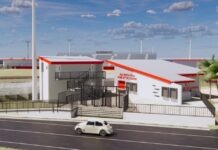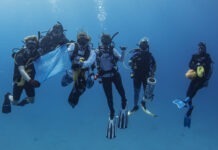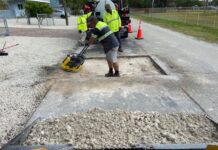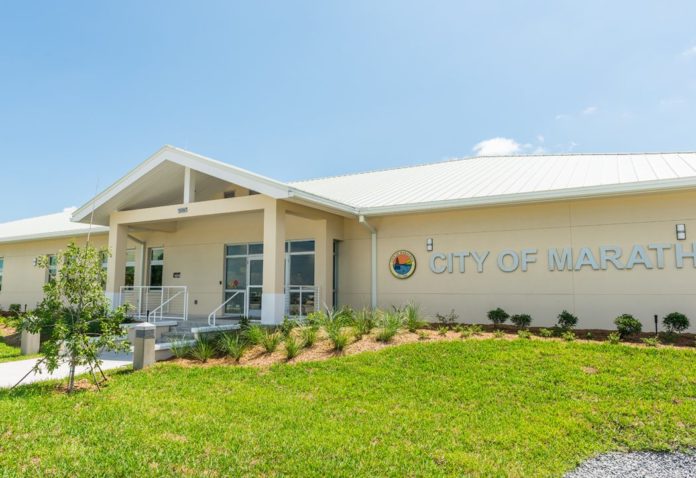The “budget” portion of the Marathon City Council’s final budget hearing special call meeting on Sept. 21 took less than 10 minutes, and for the second time was unanimously approved with no public comment.
Instead, the council spent the majority of its time discussing the city’s building allocations and permitting process moving forward in the wake of the recent revocation of 300 affordable housing allocations given to the city in 2018.
The budget and tax rate tentatively approved at the Sept. 13 city council meeting went unchanged throughout the course of Tuesday’s meeting. With a final millage rate of 2.72 mills, the city’s 2022-2023 tax rate reflects a 15.04% increase over the rollback rate – the rate required to raise the same tax revenue as in 2021-2022 given current assessed property values.
Finance director Jennifer Johnson justified the increase in part due to additional staff members in the city’s code and public works departments, along with a 9.6% cost of living adjustment for city staff and an anticipated 5% increase in health insurance costs. The increase will add roughly $9.7 million in revenue for the city’s general fund and will bring the city to 13 days shy of one year in unassigned reserves.
The new $116,909,494 budget accounts for development of the Seven Mile Marina, along with $400,000 set aside for the first time homebuyer loan program. Expected infrastructure projects include improvements to bridges, the park at the base of the Seven Mile Bridge, the unused Quay property and the community park.
In addition to approving the recommended building allocations for the current BPAS period, Marathon Mayor John Bartus made a motion to use seven of the city’s available administrative relief building allocations – set aside for use in special circumstances – in order to allow completion of affordable housing units in the La Palma development on 101st Street Ocean. Nearly complete, the development’s original building allocations were revoked as part of 300 affordable units deemed illegal in an Aug. 3 opinion handed down by Florida’s Third District Court of Appeal (DCA).
City Attorney Steve Williams revealed in the course of discussion that the city’s request for a rehearing of the affordable units case had been denied in an 8-1 decision earlier that afternoon. Short of an unlikely result should the city appeal the case to the Florida Supreme Court, a fix for the revoked allocations via the state’s next legislative session, if successful, could be more than six months away.
“There is one gentleman who is literally 25 miles into a 26-mile marathon,” said Williams, adding that by the same analogy, “If he’s at mile 25, I’m not sure anybody else was back at mile 20 yet.
“Our initial thought was to use some of our available administrative relief pool to assist that gentleman. It’s a barn door situation. … You’re nice to one person, everyone else wants you to be nice to them. … At some point someone’s going to have to make the policy calls or the legal calls or both as to what units you’re handing out … and where do you draw the line?”
“I would urge you all to pause on all of this,” said councilman Steve Cook. “Is it harsher to choose the same outcome for all as opposed to treating some better than others? … Trying to get around the court ruling by doing what looks like the right thing may just cost us a lot.”
Following discussion of several contractors’ relative progress in their respective developments both now and in the near future while the revoked units are involved in additional appeals or legislative fixes, the council voted 4-1 to abstain from granting the administrative relief allocations, with Bartus as the lone yes vote. Vice Mayor Dan Zieg also reminded the council of a 2001 decision in which the current appellants’ attorney in the 300 units case, Richard Grosso, successfully argued that a $3.3-million apartment complex violated its county’s comprehensive plan and was torn down after being previously occupied.
In other news:
- At its first public hearing, the council unanimously voted to pass an ordinance prohibiting drinking and smoking any item other than an unfiltered cigar – an exception mandated by state statutes – at Marathon’s beaches and parks, as well as establishing an enforcement mechanism. The prohibition may be waived by the city council for special occasions upon request.
- At its final public hearing, the council voted to formally establish non-resident boat ramp usage fees as well as parking fees for trailers at boat ramps and vehicles at Sombrero Beach. The fee schedule is as follows: $5 per hour for the first two hours to park at Sombrero Beach, followed by $2 per hour thereafter; $25 to launch or retrieve a boat at any of the city’s three public boat ramps; and $20 per day to park a vehicle and trailer in available spaces at these ramps. The ordinance dictates that vehicles registered in Marathon or Key Colony beach may register annually to use these facilities at no cost, and at its Sept. 13 meeting, the council indicated its wishes to extend the same free use to year-round Marathon and KCB residents as evidenced by documents such as driver’s licenses, voter registration cards and leases. The privilege of free use is not transferable to short-term renters or visitors. The exact registration process used is yet to be determined, as is the date of practical enforcement.


















